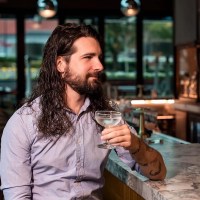Last year, for the release of The Balvenie’s Raw Craft series, we sat down and spoke with the man himself, Anthony Bourdain, about Scotch, the beauty of old school pubs, and why great craftspeople do things the hard way. This year, for the new season of Raw Craft, we sat back down with Bourdain, this time to talk the future of craft and what that means for everyone, even if you aren’t a craftsperson.
Last year, you talked about how the craftspeople that are highlighted in the Raw Craft series are doing things the hard way. This year there’s a new batch of people also doing just that. What about that approach do you find appealing?
It’s a romantic venture. I’m a romantic and nothing is more romantic than the pursuit of an ephemeral ideal—excellence, truth, beauty, love. It’s an extraordinary and rare thing.
You started out as a fry cook and now you’re a writer, television personality, et cetera. What, if anything, about your own craft has changed over the years?
At the end of the day it’s like building a house. You build a foundation, you show up on time, you work hard, you put all the little pieces together, and you do it as best you can. You have a certain vision in mind and you try at the end of the day to end up with something that you can walk around, examine, and feel proud of.
Growing up in Leonia, New Jersey, did you ever see yourself here doing what you’re doing, crafting what you’re crafting?
Maybe when I was a boy I might have had delusions of being a writer or a traveler or a pirate or something like that, but those had long, long been put aside by the time I wrote Kitchen Confidential. I was pretty much—not pretty much, I was absolutely certain—that this was it for me. I was going to be working the line, dunking French fries and making steak frites.
Who did you look to as inspiration for who you are now?
I had very good English teachers as a high school student—they were important to me. What I learned in those classes and from them, that inspiration resonated later when I had the opportunity to write. Filmmakers have also been very inspiring to me, especially the ones who went their own way. There are a lot of cinematographers and a lot of directors whose work I’ve always admired and always watched throughout my life no matter what I was doing. The things I do now were very much formed by the films I admired. There are also some writers I looked to: George Orwell, George V. Higgins, Joan Didion, and Hunter S. Thompson.
Now, doing what you do, are you looking to anyone else for craft inspiration?
I mostly look to directors of photography. These are people who work on films to create unique looks for directors. People like Christopher Doyle who worked for Wong Kar-wai, Vittorio Storaro who worked with Bertolucci, for instance. These are examples of people whose work really excites me and makes me want to go and create something.
Many of the craftspeople that you’ve worked with have been doing what they do for decades. What do you think we can do as a culture to foster creativity and make sure that more and new craftspeople continue to pursue their own visions and goals?
I’ve not a clue. Maybe one of the reasons I admire these people so much is I fear for the future of many of these trades and crafts. I think it’s a miracle that they persist and live within these people.
Is there any specific sector that we need more craftspeople?
We need them in every sector. I don’t care if you’re making a cheeseburger or a pair of shoes. The pursuit of excellence and the insistence on doing the best you can is an instinct that we’re in peril of losing.
What about craft beers, spirits, and cocktails? Do you think we’re living in a bubble that’s going to burst?
I’m sure there is a bubble, but it won’t go back to the way it was before. I’d like to see them persist and maybe even normalize. There will always be increased value placed on someone who makes a good, classic cocktail I hope. There will also always be increased respect for somebody who knows how to make a seemingly simple drink like a martini correctly and honoring tradition. I don’t think that’s going to change.
Speaking of cocktails, do you have a favorite?
I’m a Negroni drinker. I think it’s the perfect drink—three ingredients in equal proportions with a slice of orange zest in there. Perfect.
Besides watching the Raw Craft series, how can you people find other craftspeople and support them?
Just think about the objects in your every day. If you like books, for example, think about how people used to make those by hand—bookbinders—then Google that shit. There’s somebody out there.
You can check out the season finale of Raw Craft here, or catch up on the other episodes here.



